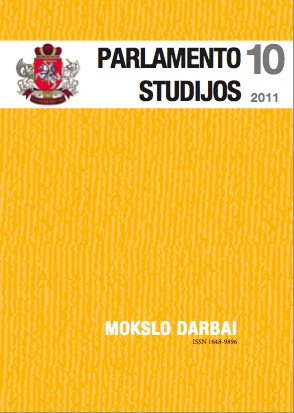The Vilnius Dietine Envoys at the Diet of the Republic of the Two Nations During 1717–1793: Status and Parliamentary Activities Forms
DOI:
https://doi.org/10.51740/ps.vi10.302Keywords:
Diet (Lith. Seimas) of the Republic of the Two Nations, Vilnius dietine (Lith. Seimelis), envoys, instructions, law of the liberum veto, 18th centuryAbstract
The Vilnius dietine envoys, based on their palatinate rank, were third in the context of the entire Republic of the Two Nations and first on a Grand Duchy of Lithuania (hereinafter the GDL)-wide scale. This priority was valid in many areas of parliamentary practice with the seating place for envoys being ultimately connected with rank. But this priority could have varied and the significance of the Vilnius dietine envoys grown especially in those instances where the envoys from the palatinates of Krakow and Poznań, who were first in rank, failed to attend the diet (which occurred in 1722 and 1761). It is necessary to note that the envoys frequently used to stress the uniqueness of their palatinates and at the same time their dietines in speeches given in the diet. In addition, the Vilnius dietine envoys were usually treated as the foremost GDL envoys and they frequently spoke even in the name of the entire GDL. This reveals the exceptional status of the Vilnius dietine envoys, which we could describe as being the most prestigious in respect to all the envoys from the GDL. An internal hierarchy also existed among the Vilnius dietine envoys. Although this distinction were not discernable in the instructions from the dietines, the diet diaries frequently indicate who was the first envoy and who the second. The first envoy was sometimes still called the senior envoy in diet diaries and the second envoy was sometimes called the junior envoy.
It is necessary to distinguish the most active Vilnius dietine envoys who spoke fairly frequently, namely Jonas Antanas Horainas (Jan Antoni Horain) (who spoke 14 times at the 1746 diet, 10 at 1754 diet, and 13 at the 1764 diet), Jonas Benediktas Volskis (Jan Benedykt Wolski) (9 times at the 1735 diet), Liudvikas Tiškevičius (Liudwik Tyszkiewicz) (10 times at the 1780 diet), Adomas Čartoriskis (Adam Czartoryski) (16 times at the 1782 diet), and Tadas Korsakas (Tadeusz Korsak) (23 times at the 1790–1792 diet). One must remember that these forms of activity also affected the diet’s duration. Until the late 18th century, the Vilnius dietine envoys gave speeches in the diets often on the basis of dietine instructions and if the occasion afforded raised the demands fixed in these documents. In fact, the relatively small number of speeches shows that the dietine envoys did not have any opportunity to present the entire content of the dietine instructions. One more form of the radical envoy activity was to break up the diet by using the right of veto, which was especially rarely used by the Vilnius dietine envoys. On only one occasion did the Vilnius dietine envoys contribute to and become one of the most active initiators in breaking up a diet, i.e. the 1729 extraordinary Hrodna diet.








 The metadata of the scholarly journals and publications of the Lithuanian National Martynas Mažvydas Library is distributed by
The metadata of the scholarly journals and publications of the Lithuanian National Martynas Mažvydas Library is distributed by 